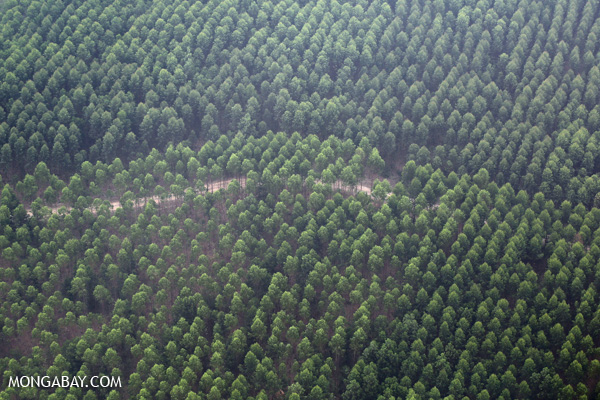
Pulp and paper plantation in Sumatra. Photo by Rhett Butler.
Several more clothing companies have committed to eliminate fiber produced via destruction of endangered forests, adding momentum to a zero deforestation movement within the fashion sector, argues a new report published by Canopy, an environmental non-profit.
This week Canopy announced Levi Strauss & Co., Marks & Spencer, Aritzia, ASOS, Under the Canopy, and Portico have joined its Fashion Loved by Forest initiative, which includes a commitment to source clothing fiber that doesn’t come via conversion of old-growth and high conservation value forests. Canopy says more than 25 companies, representing over $75 billion in annual sales, have now joined the initiative.
“The largest and most iconic clothing brands on earth are sending clear signals that are growing in strength and conviction: no more ancient and endangered forest fibre in our fashions,” said Nicole Rycroft, Executive Director of Canopy, in a statement. “Systemic change in fibre sourcing is becoming unavoidable.”

Fashion Loved by Forest participants
The newest parters issued statements in support of the initiative.
“This is an important initiative for the fashion industry. If we act now we can eradicate deforestation from the supply chains of man-made fibres,” said Fiona Wheatley, Marks & Spencer’s Sustainable Development Manager, via Canopy’s press release. “We’re embracing the vision and are ready to work with our peers to create real change on the ground to ensure a bright future for threatened forests.”
“Building on our long-standing commitment to sustainability, Levi Strauss & Co. is joining this effort to address the sustainable sourcing of forest-based fabrics,” added Michael Kobori, Vice President of Sustainability for Levi Strauss & Co. “We look forward to working with other apparel companies, as well as with our suppliers and Canopy, to increase transparency and traceability in our supply chain and ensure that the world’s ancient and endangered forests are not used to make our products.”
Canopy launched its campaign in 2012 aiming to highlight the increasing use of tree-based fibers in fabrics.
“Most rayon, viscose, modal, lyocell and other trademarked cellulosic fabrics start their journey as trees,” the group said. “Canopy’s research has found that ancient and endangered forests are increasingly making their way into clothing.”
The Fashion Loved by Forest initiative includes several approaches to shift the fashion industry toward more sustainable practices, including pushing companies to “eliminate their use of fabrics that contain endangered forest fibre; engage their suppliers to shift away from any endangered forest sourcing, advance long-term conservation solutions and alternative fabric options that are more sustainable such as recycled fabrics or non-wood fibers like straw.”
The report uses endangered forests in Sumatra, British Columbia, and Quebec — and their resident flora, fauna, and communities — to highlight the urgency of the issue.
Related articles
Dissolving pulp: the threat to Indonesia’s forests you’ve probably never heard of

(09/23/2014) If the term “dissolving pulp” evokes nothing for you, you’re not alone. Not many people have heard of it, and the very term “dissolving pulp” is so generic it’s hard to imagine it could be a threat to anything.
Clothing brand Stella McCartney pledges to use deforestation-free fabrics
(04/30/2014) Luxury fashion brand Stella McCartney has pledged to eliminate fabrics sourced via destruction of old-growth and endangered forests from its supply chain by April 2017.
Is deforestation-free clothing possible?

(04/02/2014) H&M and Zara/Inditex, two of the world’s largest clothing companies, today pledged to eliminate old-growth forest destruction from their products. The commitment lends support to a new front on efforts to cut deforestation out of the supply chains of global brands. Until now, most of the focus of campaigners has been on pulp and paper, timber, and agricultural commodities like soy, palm oil, and cattle.
Dozens arrested after community fights deforestation by paper company in Indonesia
(03/07/2013) Dozens of villagers from Indonesia’s North Sumatra province traveled to Jakarta this week to demand the release of 16 farmers who remain in detention after conflicts erupted between indigenous communities in Humbang Hasundutan district and PT Toba Pulp Lestari, a unit of the pulp and paper giant Asia Pacific Resources International Holdings (APRIL).








